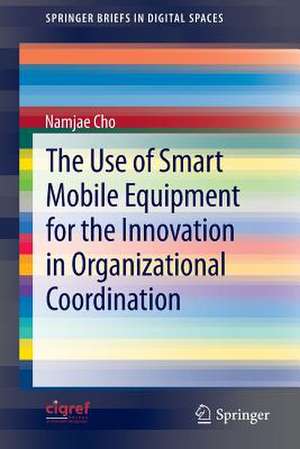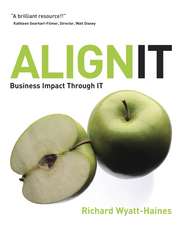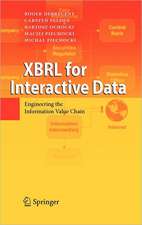The Use of Smart Mobile Equipment for the Innovation in Organizational Coordination: SpringerBriefs in Digital Spaces
Autor Namjae Choen Limba Engleză Paperback – 4 aug 2012
Preț: 341.22 lei
Nou
Puncte Express: 512
Preț estimativ în valută:
65.30€ • 67.100$ • 55.19£
65.30€ • 67.100$ • 55.19£
Carte tipărită la comandă
Livrare economică 10-24 martie
Livrare express 31 ianuarie-06 februarie pentru 45.81 lei
Preluare comenzi: 021 569.72.76
Specificații
ISBN-13: 9783642308468
ISBN-10: 3642308465
Pagini: 42
Ilustrații: IX, 36 p. 7 illus.
Dimensiuni: 155 x 235 x 20 mm
Greutate: 0.1 kg
Ediția:2013
Editura: Springer Berlin, Heidelberg
Colecția Springer
Seria SpringerBriefs in Digital Spaces
Locul publicării:Berlin, Heidelberg, Germany
ISBN-10: 3642308465
Pagini: 42
Ilustrații: IX, 36 p. 7 illus.
Dimensiuni: 155 x 235 x 20 mm
Greutate: 0.1 kg
Ediția:2013
Editura: Springer Berlin, Heidelberg
Colecția Springer
Seria SpringerBriefs in Digital Spaces
Locul publicării:Berlin, Heidelberg, Germany
Public țintă
ResearchCuprins
Introduction.- Theoretical Background and Research Hypotheses.- Research Method.- Results of Data Analysis.- Case Study of the Use of Mobile Office.- Conclusion.
Recenzii
From the reviews:
“In this small book, Namjae Cho describes the adoption of mobile office services within organizational coordination and their implication on innovation. … The book offers a comprehensive overview of how the use of smart mobile equipment supports tasks and thereby influences innovation in organizations. The detailed analysis of the case study supports the findings from the statistical analysis and gives deep insight into a real-world scenario.” (Edgar R. Weippl, ACM Computing Reviews, December, 2012)
“In this small book, Namjae Cho describes the adoption of mobile office services within organizational coordination and their implication on innovation. … The book offers a comprehensive overview of how the use of smart mobile equipment supports tasks and thereby influences innovation in organizations. The detailed analysis of the case study supports the findings from the statistical analysis and gives deep insight into a real-world scenario.” (Edgar R. Weippl, ACM Computing Reviews, December, 2012)
Textul de pe ultima copertă
Recent increases in uncertainty and speed of market change are driving the adoption of new intelligent mobile office systems. Organizational information systems paradigm suggests that a right match between organizational characteristics and the use of technology is critical in producing desired results. Following such perspective this study focused on the relationship between task characteristics and the use of mobile office systems with an intention to find out factors that affect the adoption of modern mobile office systems. The research results show that in performing tasks with high mobility users tend to use extensive mobile office functions. When the task has a high level of interdependency with external business partners, users relied on specialized mobile functions such as FFA, SFA and ERP. Highly volatile environment with many unexpected task changes caused an extensive use of task specific functions that help to solve problems at hand. Further, analyses of the differences of mobile office use by department showed that sales department used more communication functions than others, while administrative departments rely more on such task specific functions as mobile CRM and KM than others. Additional case study shows how the application of new technology the effectiveness of organizational coordination. Based on the research the concept of convergent coordination is suggested as well as the direction for future research.
Caracteristici
Shows how new mobile technology leads to business innovation? Includes supplementary material: sn.pub/extras



















